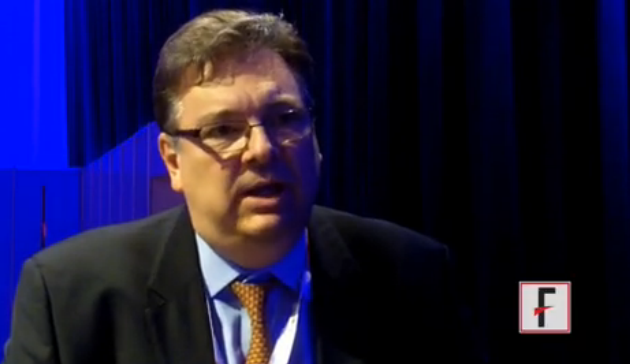User login
MADRID – Newly reported findings on the benefits from a dose-dense chemotherapy regimen for safely boosting the event-free survival rate in women with node-positive breast cancer help to better establish the dose-dense chemotherapy approach for these high-risk patients, Dr. Antonio Llombart-Cussac said in an interview during the European Society for Medical Oncology Congress.
Although the dose-dense strategy for administering epirubicin, paclitaxel, and cyclophosphamide has been widely adopted in the United States and Germany it has remained poorly used in most other European countries. The new German results, coupled with a similar report from Italian investigators last year, should help spark renewed interest in relying on the dose-dense approach for treating patients with early, node-positive breast cancer that is either triple negative or has the luminal B phenotype, said Dr. Llombart, head of medical oncology at Arnau de Vilanova Hospital in Valencia, Spain.
Dr. Llombart has received honoraria as a speaker for or advisor to Celgene, GlaxoSmithKline, Roche, AstraZeneca, Novartis, and Lilly.
On Twitter @mitchelzoler
The video associated with this article is no longer available on this site. Please view all of our videos on the MDedge YouTube channel
MADRID – Newly reported findings on the benefits from a dose-dense chemotherapy regimen for safely boosting the event-free survival rate in women with node-positive breast cancer help to better establish the dose-dense chemotherapy approach for these high-risk patients, Dr. Antonio Llombart-Cussac said in an interview during the European Society for Medical Oncology Congress.
Although the dose-dense strategy for administering epirubicin, paclitaxel, and cyclophosphamide has been widely adopted in the United States and Germany it has remained poorly used in most other European countries. The new German results, coupled with a similar report from Italian investigators last year, should help spark renewed interest in relying on the dose-dense approach for treating patients with early, node-positive breast cancer that is either triple negative or has the luminal B phenotype, said Dr. Llombart, head of medical oncology at Arnau de Vilanova Hospital in Valencia, Spain.
Dr. Llombart has received honoraria as a speaker for or advisor to Celgene, GlaxoSmithKline, Roche, AstraZeneca, Novartis, and Lilly.
On Twitter @mitchelzoler
The video associated with this article is no longer available on this site. Please view all of our videos on the MDedge YouTube channel
MADRID – Newly reported findings on the benefits from a dose-dense chemotherapy regimen for safely boosting the event-free survival rate in women with node-positive breast cancer help to better establish the dose-dense chemotherapy approach for these high-risk patients, Dr. Antonio Llombart-Cussac said in an interview during the European Society for Medical Oncology Congress.
Although the dose-dense strategy for administering epirubicin, paclitaxel, and cyclophosphamide has been widely adopted in the United States and Germany it has remained poorly used in most other European countries. The new German results, coupled with a similar report from Italian investigators last year, should help spark renewed interest in relying on the dose-dense approach for treating patients with early, node-positive breast cancer that is either triple negative or has the luminal B phenotype, said Dr. Llombart, head of medical oncology at Arnau de Vilanova Hospital in Valencia, Spain.
Dr. Llombart has received honoraria as a speaker for or advisor to Celgene, GlaxoSmithKline, Roche, AstraZeneca, Novartis, and Lilly.
On Twitter @mitchelzoler
The video associated with this article is no longer available on this site. Please view all of our videos on the MDedge YouTube channel
AT ESMO 2014
